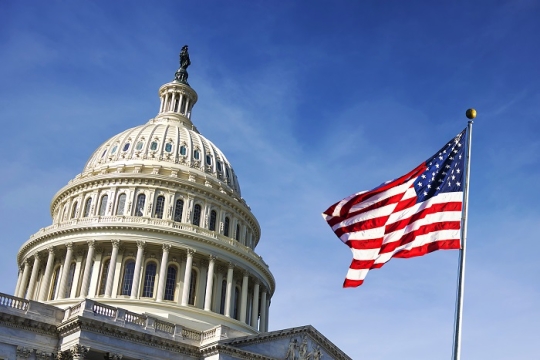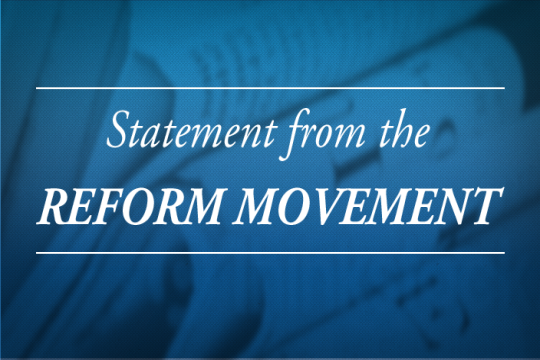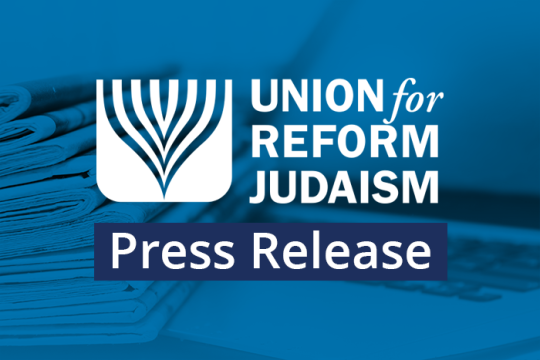

The Reform Movement supports the Jewish State and has oftentimes pushed Israel to live up to its foundational principle to be both a Jewish state for all Jewish people and a democratic state offering equal rights to all those living within. As such, the Reform Movement fights for religious pluralism within Israel, supports foreign aid for Israel’s security, and is particularly outspoken in support of the peace process. In an April 1998 letter to President Clinton, Rabbi and then-president of the URJ Eric Yoffie wrote that, "Israel's long-term security needs are best served by moving the peace process forward, and the U.S. must play a vigorous role in ensuring that all parties act in accordance with the letter and spirit of the agreements to which they have committed themselves." In its 1995 resolution, the URJ called for US support for the peace process, stating "United States Government to continue to lend its good offices to the ongoing negotiations for peace; and to continue support for the process through ongoing foreign aid support for Israel and her negotiating partners."
At the URJ Biennial in 2009, the URJ passed a resolution, which commend[ed] the governments of the United States and Canada for their continued and unconditional support of Israel.
The Union for Reform Judaism and the Central Conference of American Rabbis (CCAR) have been outspoken in their support of the peace process. Throughout the Reform Movement's history, in times of peace and in times of strife, we have spoken out in unequivocal and unconditional support of the State of Israel and her people. This support stems from a love of the land and an understanding that the destinies of the Jewish people and of Israel are intertwined in an unbreakable connection (URJ Resolution, Support for Israel, 2009)
The Reform Jewish Movement, deeply rooted in its love for Israel and desire to see the Jewish state live in peace and security with its neighbors, opposes the movement to boycott, divest from and sanction Israel. In 2005, the Union for Reform Judaism passed a resolution identifying BDS as an obstacle to peace, stating, “We deeply deplore efforts that blame Israel for the failure of the peace process or that seek to use economic actions against Israel, including singling out for divestment companies working in or doing business with Israel. These efforts are more likely to hinder rather than advance the peace process.” According to a 2016 Central Conference of American Rabbis resolution condemning BDS, “The BDS movement does not recognize the right of Israel to exist as a Jewish state. Its leaders ignore the complexity of Israel’s reality and fail to offer a reasonable path forward in resolving the Israeli-Palestinian conflict.”
Our Movement has been engaged in the important work to encourage partnership and reconciliation over isolation and divestment, particularly through our interfaith relationships. The 2005 URJ resolution encourages congregations to “engage in dialogue within local communities to build understanding, to develop bridges of communication with those in a position to influence their own organizations’ institutional policies and to explain the counterproductive impact of divestment policies.” Through authentic relationships with leaders in faith, academia, progressive activism and government, we can work to stem the tide of deplorable anti-Israel activism.
The Union for Reform Judaism (URJ) and the Central Conference of American Rabbis (CCAR) have been outspoken in support of the peace process. In an April 1998 letter to President Clinton, Rabbi Eric Yoffie wrote that, "Israel's long-term security needs are best served by moving the peace process forward, and the U.S. must play a vigorous role in ensuring that all parties act in accordance with the letter and spirit of the agreements to which they have committed themselves." In its 1995 resolution the URJ called for US support for the peace process, stating "United States Government to continue to lend its good offices to the ongoing negotiations for peace; and to continue support for the process through ongoing foreign aid support for Israel and her negotiating partners." At the URJ Biennial in 2009, the URJ passed a resolution which commend[ed] the governments of the United States and Canada for their continued and unconditional support of Israel.
The Religious Action Center was active in supporting an economic aid package to Israel, the Palestinians, and Jordan to implement the Wye Agreement and to move the Middle East peace process forward. In a November 4, 1999 letter to the House leadership, Rabbi David Saperstein expressed the need to fund Wye as well as other international priorities:
I am writing to express our concerns over the foreign operations bill being considered in Congress. We feel that it is vital to incorporate the President's commitment to fully fund the Wye aid package. The United States has committed itself, rightly, to help defray the costs of the mid-east peace process, and both our national interests and our integrity depend on our doing so. However, it would be unacceptable to provide these funds at the expense of essential aid from other foreign affairs programs. The Development Fund for Africa, the United States Development Fund and other key programs, especially those affecting Latin America, are already at the lowest funding levels in recent memory. Maintaining a robust foreign assistance program is in the best interest of the United States. Additional cuts will make it impossible for the U.S. to fulfill our international obligations. We urge you to craft a foreign operations bill that will provide funding for the Wye aid package and for the critical development and humanitarian aid necessary for the United States to maintain our role as the global leader.





